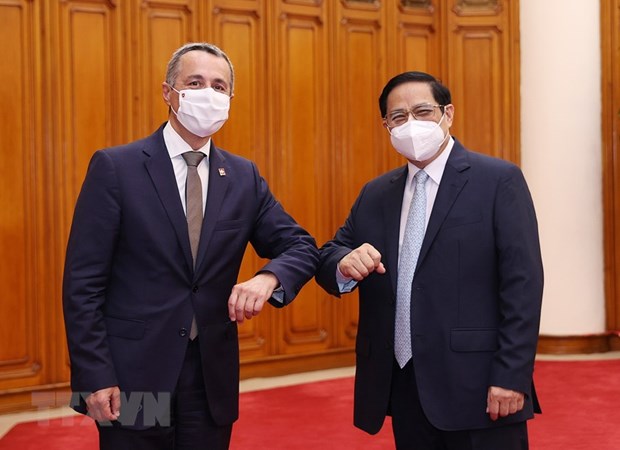
Prime Minister Pham Minh Chinh (R) and Swiss Vice President
and Foreign Minister Ignazio Cassis (Photo: VNA)
The Swiss Government has decided to provide Vietnam with an emergency aid package of 500,000 COVID-19 testing kits, 300,000 face masks, 30 ventilators, and other medical supplies.
PM Chinh also asked Switzerland to help Vietnam access COVID-19 vaccine supply sources as soon as possible. He also recommended the sides boosting cooperation in technological transfer and production of pharmaceuticals, including COVID-19 vaccines and treatment drugs.
The leaders reviewed outcomes of cooperation between the two nations over the past five decades and discussed orientations to lift the relations to new heights in the future. They also talked about the preparation for Vietnamese President Nguyen Xuan Phuc's visit to Switzerland.
Both host and guest agreed to speeding up negotiations for the signing of a free trade agreement between Vietnam and the European Free Trade Association (EFTA), of which Switzerland is a member.
The Vietnamese PM proposed Switzerland further create favourable conditions for Vietnamese goods and farm produce to enter the Swiss and EU markets; boost cooperation with Vietnam in sectors of Swiss strength; and early research and build bilateral cooperation projects on digital transformation.
Chinh also took the occasion to express his gratitude for Switzerland's development aid worth 650 million USD granted for Vietnam in the past more than 30 years.
For his part, the Swiss Vice President stressed the Swiss Government and people highly evaluate Vietnam's effective use of the aid, adding that Switzerland will offer Vietnam more official development assistance (ODA) during 2021 - 2024.
The two sides agreed to continue working closely at multilateral regional and international forums, with Ignazio Cassis praising the role and contribution of ASEAN and Vietnam in seeking solutions for the Myanmar issue.
The Vietnamese and Swiss officials highlighted the importance of ensuring free navigation and navigation, security, peace and stability in the East Sea as well as of addressing disputes in the waters via peaceful measures in line with international law, particularly the 1982 United Nations Convention on the Law of the Sea (UNCLOS)./.